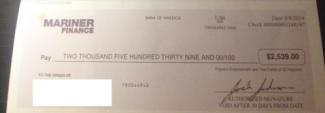Strapped for cash? Beware of high-cost loans disguised as a check
Have you recently received a check in the mail in your name from a bank or other financial company that you didn’t request? For many cash-strapped residents, the option to use these checks to pay for unexpected expenses, like a car or home repair, may appear to be a good choice. However, consumers beware, that check may actually be a loan offer that can carry exorbitant interest rates, processing fees, and other charges.
A growing number of financial companies are mass-mailing checks to consumers across the country, making it easy for them to accept a high-interest loan just by signing the check. Some companies are mailing checks for loans in the amount of $1,200 with interest rates as high as 36 percent. Once the check is cashed, consumers are on the hook to pay back the loan amount to the financial company, plus interest and fees. A recent Washington Post story explored how many cash-strapped consumers are targets for companies offering high-cost loans.
To help you make an informed financial decision about how to choose any loan and how to pay it back, especially those offered in the form of a check, here are six easy steps you can follow:
- If you need a small loan, check first with your credit union or bank. Local banks, community banks, and credit unions can provide short-term loans with better rates. Make sure you check all available offers and find the credit offer with the lowest interest rate and minimum fees.
- Read the fine print in loan contracts. By taking out any loan you may be obligated to pay additional fees, penalties, and attorney fees if you fail to pay back the loan.
- Check the interest rate. District law caps the annual interest rate on loans at 24 percent. If you find a company trying to charge District residents more than 24 percent, contact our Office of Consumer Protection at (202) 442-9828.
- If you are having trouble paying back a loan, contact your creditor or loan servicer. Often, creditors are willing to work with consumers that are making their best efforts to pay back loans.
- Learn more about managing a debt and debt collection. If you are in debt and having issues with a debt collector, please see our consumer guide on debt collection to learn more about your rights and how to deal with a debt collector or lawsuit.
If you have questions about loans, need help managing a debt or dealing with a debt collector, or have a consumer complaint, call our Office of Consumer Protection at (202) 442-9828.

